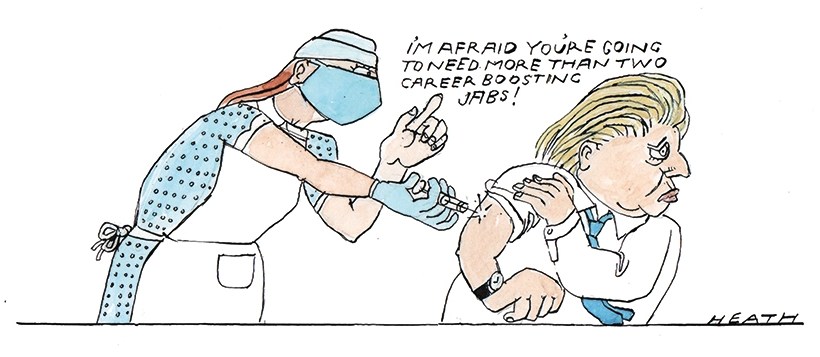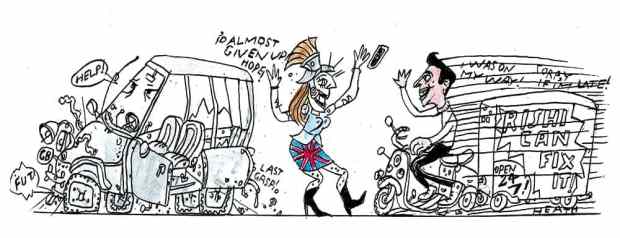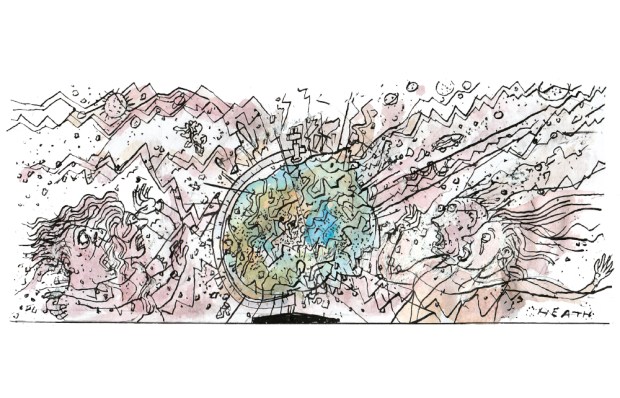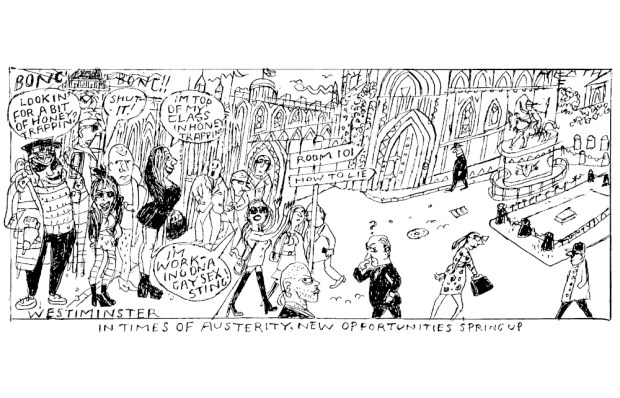Home
Britain brought its last troops home from Afghanistan, having flown out more than 15,000 people since 14 August; but the operation failed to evacuate perhaps 1,000 eligible Afghans, some of whom had worked for the government, and 100 to 150 British nationals. Pen Farthing, who runs an animal charity in Afghanistan, returned in an aeroplane he had chartered with 94 dogs and 79 cats; ‘Meanwhile my interpreter’s family are likely to be killed,’ commented Tom Tugendhat, the chair of the Foreign Affairs Select Committee, who has served in Afghanistan.
In the seven days up to the beginning of the week, 765 people had died with coronavirus, bringing the total of deaths (within 28 days of testing positive) to 132,376. (In the previous week deaths had numbered 697.) In a week, numbers remaining in hospital rose from 6,475 to 6,942. In Scotland, where only 74 per cent of 18- to 29-year-olds had had a first dose of the vaccine, cases detected rose, with more than 1 per cent of the people of Dunbartonshire and North Lanarkshire being found to have Covid in a week. Nightclubs in Northern Ireland remained closed. Michael Gove, the Chancellor of the Duchy of Lancaster, was seen on video dancing strangely at a nightclub in Aberdeen.
Kwasi Kwarteng, the Business Secretary, said that lorry drivers, of whom there is a shortage, would not be eligible for a skilled-worker visa or be added to the shortage occupation list to allow companies to recruit them from abroad. Of the 467 department stores in the United Kingdom open in 2016, all but 79 had shut, it was found. Of 1,183 Post Office branches that closed during the pandemic, 260 had not reopened. Plastic knives and forks would be banned under government plans, but there were no plans this week to tax disposable nappies. Ted Dexter, the England and Sussex batsman, died aged 86.
Abroad
The United States withdrew from Afghanistan. President Joe Biden, aged 78, limited future foreign interventions by saying: ‘We will stay clearly focused on the fundamental national security interest of the United States of America.’ With its coalition allies, America had evacuated 123,000 civilians. As the operation neared its end, an Islamic State bomber with a belt of explosives killed up to 170 people near a gate of the airport, including 13 US servicemen. Even before the bombing, hellish scenes were seen for days of thousands of people, some queuing knee-deep in an open sewage canal, jostling in the hope of being flown out. An American drone strike three days later was said to have thwarted another bomb attack on the airport, but relatives of those killed said ten members of one family had died, including six children. Another drone strike by America killed a man said to be a planner for IS-K, the regional affiliates to the Islamic States in the so-called Khorasan Province. This followed a remark about the attackers made by Mr Biden: ‘We will hunt you down and make you pay.’ In a sad press conference at the White House, during which he bowed his head till it rested on the folder he was holding at the lectern, he had said: ‘I bear responsibility for fundamentally all that’s happened of late.’
The total in the world reported to have died with coronavirus reached 4,435,620 by the beginning of the week. In the United States, a report from the Office of the Director of National Intelligence determined that Covid was not developed in China as a biological weapon. Half the population of Australia continued in lockdown. New Zealand, which has suffered only 26 deaths, reported the death of a woman from myocarditis, a rare side-effect of the Pfizer vaccine. More than 70 per cent of the adult population of the European Union were fully vaccinated. In India 502 million adults had received at least one dose of a vaccine. Hurricane Ida swept over New Orleans, damaging buildings and leaving a million in Louisiana without electricity. More than 22,000 people living by Lake Tahoe in California left their homes as wildfires closed in. Fire rushed through an 18-storey block of flats in Milan.
The population of the Republic of Ireland exceeded five million for the first time in comparable territory since 1851. The wholesale price of Robusta coffee beans rose to 50 per cent above last year’s as exports from Vietnam were hit by Covid lockdowns and high shipping charges. China’s video-game regulator reduced gaming for those under 18 to an hour a day, at weekends. CSH
Got something to add? Join the discussion and comment below.
Get 10 issues for just $10
Subscribe to The Spectator Australia today for the next 10 magazine issues, plus full online access, for just $10.
You might disagree with half of it, but you’ll enjoy reading all of it. Try your first month for free, then just $2 a week for the remainder of your first year.














Comments
Don't miss out
Join the conversation with other Spectator Australia readers. Subscribe to leave a comment.
SUBSCRIBEAlready a subscriber? Log in